The third and final day of the 4th International Conference on Open and Distance e-Learning (ICODeL) opened with Special Session 3: Special Session on Gender Considerations in e-Learning. This session was moderated by Dr. Joane V. Serrano, Director of the UPOU Office of Gender Concerns (OGC) and Office of Public Affairs (OPA).
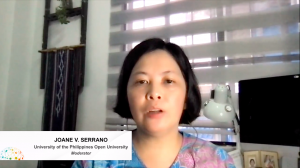
Dr. Joane V. Serrano moderates Special Session 3: Special Session on Gender Considerations in e-Learning.
For this session, a total of six gender-related studies were presented. Through these presentations, participants gained further insights on how to ensure gender mainstreaming and address gender-related issues in their respective institutions.
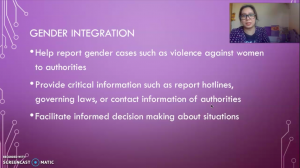
Asst. Prof. Finaflor F. Taylan presents “Gender and Distance Psychosocial Support During the Pandemic: Lessons and Opportunities from Case Studies”
Asst. Prof. Finaflor F. Taylan of UPOU presented the first paper titled “Gender and Distance Psychosocial Support During the Pandemic: Lessons and Opportunities from Case Studies”, which is based on the results from case studies of four different cases of gender issues that were encountered and addressed by the volunteer group United Registered Social Workers (URSW), composed of social workers who can provide psycho-social support or psychological first-aid during the pandemic. In her presentation, Asst. Prof. Taylan shared the processes and strategies they had employed to address these issues, which included the use of information and communication technology (ICT). Gender integration was also done by means of helping report gender cases to authorities and informing the clients about critical information to enable them to make informed decisions about their situations. Moreover, empathy and inclusivity for all genders were observed. Through these case studies, Asst. Prof. Taylan noted that the use of ICT is vital in the facilitation of distance psychosocial support services. It was also recommended that in order to address such cases, an accessible online appointment system and networked referral and case management system should be put in place, and that gender should always be integrated in these support services. To end her presentation, Asst. Prof. Taylan emphasized the importance of gender mainstreaming and equitable access to gender services especially in the context of the pandemic, as key to the fulfillment of human rights.
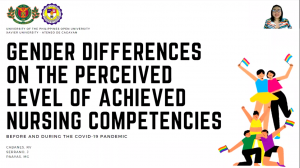
Asst. Prof. Ria Valerie Cabanes presents “Gender differences on the perceived level of achieved nursing competencies before and during the COVID-19 pandemic”
Asst. Prof. Ria Valerie Cabanes, Program Development Associate of the Master of Arts in Nursing (MAN) Program, Faculty of Management and Development Studies (FMDS), UPOU presented the second paper titled “Gender differences on the perceived level of achieved nursing competencies before and during the COVID-19 pandemic” which she had co-authored with Dr. Joane V. Serrano and Dr. Mary Grace Paayas, Dean of the College of Nursing, Xavier University-Ateneo de Cagayan. In her presentation, Asst. Prof. Cabanes stated that given the fact that nursing is a female-dominated discipline, the researchers were tasked to focus on gender differences and the possible impact on the perceived level of achievement of nursing competencies before and during the pandemic. Through the conduct of an online survey, it was discovered that the perception levels of both students and teachers were on a high level of perceived achieved nursing competencies. Through this result, the study found that students had many opportunities to perform the intended learning outcomes of the program and based on statistical tests, there were no significant differences between gender and the perception of the level of achieved nursing competencies. Based on the study, it was recommended that academic institutions should acknowledge the existence of differences that may create gaps in the achievement of nursing competencies and implement a consistent approach to address these. Furthermore, academic institutions should work to reinforce gender-specific strategies and conduct future researches to identify gender-related interventions to enhance the achievement and quality of students’ nursing competencies.
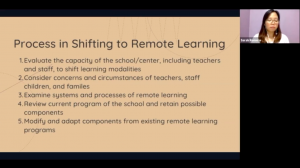
Ms. Sarah Romero presents “Teaching At Home: Experiences of Daycare Teachers in Shifting to Remote Learning during the COVID-19 Pandemic”
Ms. Sarah Romero, Head Facilitator, Kalinga Daycare Center presented the third paper titled “Teaching At Home: Experiences of Daycare Teachers in Shifting to Remote Learning during the COVID-19 Pandemic” which she had co-authored with Assoc. Prof. Excelsa Tongson, Deputy Director for Training and Outreach, University of the Philippines Center for Women and Gender Studies (UPCWGS). In her presentation, Ms. Romero shared how the implementation of the Enhanced Community Quarantine (ECQ) due to the pandemic affected the delivery of early childhood education, specifically in daycare centers. For the Kalinga Daycare Center, they were forced to shift to online and remote learning, which teachers were unfamiliar with. In the shift to remote learning, the proper evaluations and considerations were made regarding the capacities, circumstances, and concerns of the teachers, staff, children, and their families. Best practices from existing remote learning programs were integrated with the relevant components of the current program of the daycare center. With that, both asynchronous and synchronous sessions were facilitated, which encouraged children to accomplish and share their activities in the arts. Due to remote learning, several challenges were encountered such as the negative effect on teachers’ mental health, digital competency, and the physical surroundings or physical environment. To end the presentation, Ms. Romero shared the learnings they had gathered from this experience for the future improvement of the delivery of learning in the daycare center, such as the need to focus on the needs and acknowledge the situations of all teachers, children, and their families; to manage expectations, and to provide positive feedback to the teachers. She also emphasized the importance of institutional support, readiness of early childhood educators, and the strengthening and design of both remote learning and blended learning programs in early childhood education for young children.
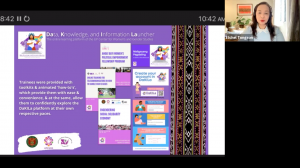
Assoc. Prof. Excelsa Tongson presents “Shifting to DaKILa: The Gender Responsive Online Learning Platform in the Time of COVID-19 Pandemic”
Assoc. Prof. Excelsa Tongson presented the fourth paper titled “Shifting to DaKILa: The Gender Responsive Online Learning Platform in the Time of COVID-19 Pandemic” which she had co-authored with Mr. Fernand Vincent Hermoso, Training Assistant UPCWGS. In her presentation, Assoc. Prof. Tongson shared that the online learning platform of the UPCWGS was conceptualized in the middle of the pandemic, as a response to the restrictions which prohibited the conduct of in-person training. Through the Data, Knowledge, and Information Launcher (DaKILa), gender-responsive training programs and short courses were continuously offered with the blended learning setup. Various participants from the UP System, other higher education institutions, individuals from public institutions, and private local and international organizations took part in these training programs and courses through DaKILa. With the use of this new platform, several advantages such as less expenses, the opportunity to learn at one’s own pace, and the introduction to new technologies were noted. On the other hand, several challenges were also noted, such as the lack of preparation, difficulty in navigating DaKILa, difficulty in working or being motivated, and unstable Internet connection; all consistent with related studies on distance learning. As a response to these concerns, the UPCWGS will continue to work on improving the delivery of their training programs and courses through DaKILa, in line with the University’s commitment to the promotion of women’s empowerment and gender justice amidst the pandemic.
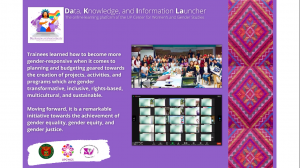
Ms. Gina Rose L. Chan presents “From F2F: Making GAD Planning and Budgeting (GPB) Work Remotely for State Universities and Colleges”
Ms. Gina Rose L. Chan, Publication Production Chief 1, UPCWGS presented the fifth paper titled From F2F: Making GAD Planning and Budgeting (GPB) Work Remotely for State Universities and Colleges” which she had co-authored with Ms. Laniza R. Lacsamana, University Extension Specialist, UPCWGS. In her presentation, Ms. Chan discussed that training workshops on Gender-Responsive Planning and Budgeting are facilitated by the UPCWGS to equip participants with the necessary knowledge and skills to prepare the respective Gender and Development (GAD) Plan and Budget Reports (PB) and the GAD Accomplishment Reports (AR) of their respective institutions under the UP System, as these are mandated to be submitted yearly to the appropriate government offices. As a response to the restrictions brought about by the pandemic, the conduct of this training workshop was done online within a blended learning setup which had the implementation of synchronous and asynchronous sessions, which consisted of six modules on topics relevant to the understanding and accomplishment of the GAD reports. A total of 42 trainees participated in this training workshop via DaKILa. With the use of this new platform, several concerns such as the further provision of training of trainers, some participants’ unfamiliarity with the blended learning setup, connectivity issues, unpaid care work, and other tasks were observed and noted. Ultimately, the participants were able to learn how to become more gender-responsive in planning and budgeting for the creation of gender-inclusive and transformative programs of their respective institutions.
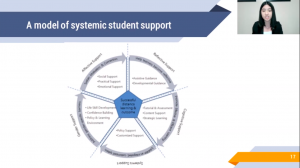
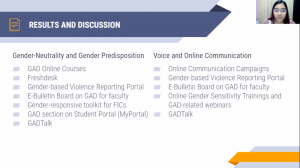
Ms. Jenine Bagos and Ms. Margarite Igcasan present “Towards a Gender Transformative Student Support in an Online University”
Ms. Jenine Bagos, Anti-Sexual Harassment Staff, UPOU-OGC and Ms. Margarite Igcasan, Project Staff, UPOU-OGC presented the sixth and final paper titled “Towards a Gender Transformative Student Support in an Online University” which they had co-authored with Dr. Joane V. Serrano. Ms. Bagos began the presentation by stating that UPOU recognizes the importance of the gender-transformative approach and the integration of gender considerations in the provision of student support services. Through the methodology of documentary and archival analysis and the adoption of the model of systemic student support, the gender practices of UPOU in terms of providing student support were examined. For the second part of the presentation, Ms. Igcasan discussed the results of the study, where it was found that UPOU had adapted several GAD practices for a gender-transformative open university such as the implementation of online communication campaigns, the gender-based violence reporting portal, gender-responsive toolkit for FICs, online gender sensitivity trainings and GAD-related webinars, and GADTalk, to name a few. Based on the results, although it was observed that UPOU has complied with the basic requirements of Gender Concerns and continues to initiate and lead programs for gender and development, these practices are not yet considered to be gender transformative. In this regard, the researchers recommended that more interviews must be done with UPOU constituents for their evaluation of the University’s existing GAD programs and recommendations for future initiatives. Moreover, the expertise of both GAD and online learning experts would also be vital in the creation of a gender-transformative UPOU.
After these presentations, a 10-minute live Question and Answer forum was done via the chat box of Special Session 3. Participants were able to seek further clarifications and advice from the presenters on efficient steps to take in immersing students to their actual field of work given the online setup and the possible integration of online practices in face-to-face learning and conduct of gender mainstreaming. Through this Special Session, participants were able to understand the importance of the conduct of gender-related studies as well as the pressing need for the continuous integration of gender perspectives and transformative development of gender-related services in the Philippines, for the benefit of all Filipinos.






